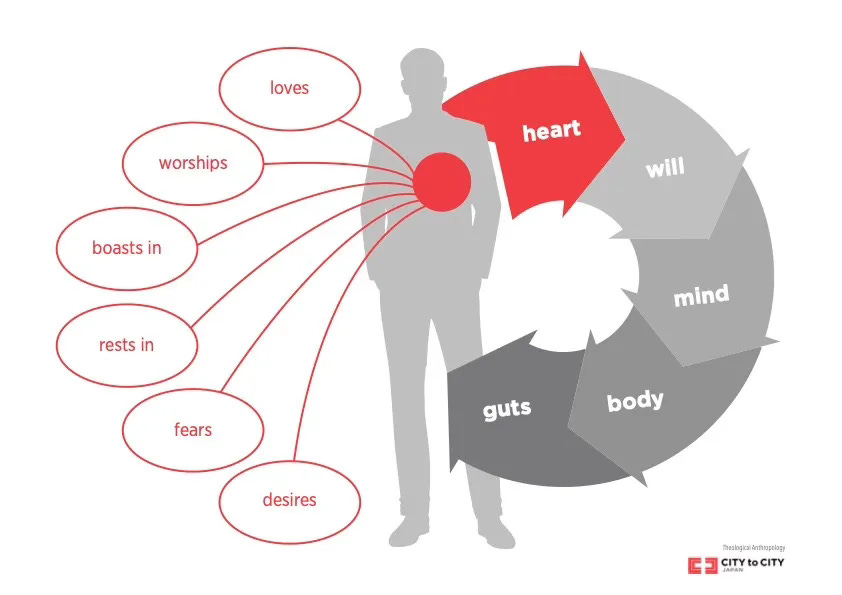Preaching so as to Reach the Heart (1/2)
Understanding the Role the Heart Plays When It Comes to Shaping Thoughts and Actions
Within Christian circles, heart is one of those words which is used freely without really knowing what it is we are talking about. We use this word so often that we assume everyone in the room shares a similar understanding. Such assumptions can lead people to drift away from the Bible’s original meaning. The word ‘heart‘ appears approximately a thousand times in the Bible and is seen as being at the core of our behaviour.
The heart is the well-spring of all our actions1
But Peter said to him, “Explain the parable to us.” And he said, “Are you also still without understanding? Do you not see that whatever goes into the mouth passes into the stomach and is expelled? But what comes out of the mouth proceeds from the heart, and this defiles a person. For out of the heart come evil thoughts, murder, adultery, sexual immorality, theft, false witness, slander. These are what defile a person. But to eat with unwashed hands does not defile anyone”2
The Bible’s central emphasis on the heart highlights the need to understand what it is and how it relates to other aspects of our Christian experience. A typical anthropological framework (study of what a human being is) might look something like this: heart, will, mind, body and gut. From here, each aspect is usually explained without much thought as to how these aspects interact with one another.
For example:
The body moves and acts
The mind thinks and believes
The will chooses and decides
The gut feels and emotes
To better understand the heart, we need to explore a whole other world within scripture, which is full of words related to the heart. These are places where the word ‘heart‘ isn’t specifically mentioned, but where the operations of the heart are inferred. As we explore these operations (such as love, worship and desire), we realise just how often scripture connects us to the heart. It is these operations which make the heart so significant when it comes to the way we preach God’s word.
According to Thomas Cranmer, “What the heart loves, the will chooses, and the mind justifies.”3 Such a statement could easily be expanded to include what the heart boasts in, rests in, fears or desires. Cranmer doesn’t see the mind as directing the will. He views the mind as being captive to what the will wants, and the will itself, in turn, is captive to what the heart wants. Andrew Katay takes Cranmer’s observation a step further when he says: “What the heart desires, the will chooses, the mind justifies, the body does, and the gut feels good about.”4 This is why it is important to preach so as to reach the heart. All of us in every aspect of our lives (in every conversation, decision and response) are consciously or unconsciously going through this process. The heart is where the underlying problem is.
We are born with a heart that loves ourselves above everything else, including God. We hunger for self-gratification, self-justification, and self-fulfilment. This is why, when left to ourselves, we love those things that make us feel good about ourselves. As a result, we require God to intervene in our lives to save us from ourselves. It is no coincidence that the first commandment says, “I am the Lord your God, You shall have no other gods before me” (Exodus 20:3). Jesus repeated the same commandment in the New Testament when he said, “You shall love the Lord your God with all your heart and with all your soul and with all your mind” (Matthew 22:37–38). The implication is that the heart is the driving force in all our lives.
Unfortunately, throughout church history, there has been an overemphasis on the intellect: “If you teach the right thing in the right order, you will come to the right conclusion.” At other times, the church has over-emphasised spiritual practices: “If you engage the body first by carrying out the right spiritual practices, it will change all the other things.” Yet, according to an array of scriptures (such as Proverbs 4:23, Matthew 15:19, James 1:14-15 and James 4:1), we are not thinking beings or doing beings first — we are desiring beings first.
It is this concept which leads Katay to conclude: “There are all sorts of interconnections between the body, mind, will, gut and heart. They are not all completely separate. Biblically, we need to say there is a solid line which runs from the heart to the other aspects, and a dotted line which runs back from these other aspects to the heart.“ In other words, the habits, liturgies and spiritual practices we choose for ourselves are often the product of our desires, and a solid line seems to travel more frequently from our heart to our habits than it does from our habits to our heart.5
In part two, we will look at how to turn any application in a sermon into a heart issue by asking the question, ‘Why do the desires of our heart make this particular thing so difficult to do?
© BloggerGiles | All Rights Reserved
Ready to embark on another journey? Click and subscribe to "The Christian Boater" on YouTube — where we explore faith on the flow!
Proverbs 4:23
Matthew 15:15-23
Ashly Null’s Thomas Cranmer’s Doctrine of Repentance: Renewing the Power to Love (Oxford: Oxford University Press, 2000), p. 42: “What the heart loves, the will chooses, and the mind justifies. The mind doesn’t direct the will. The will is captive to what the heart wants, and the mind is captive to the will.”
Back in April 2020, Andrew Katay, CEO of City to City Australia, spoke as part of a series called ‘Church in Outbreak’ produced by Redeemer City to City. This podcast provided some thoughtful techniques on how to preach to reach people’s hearts and serves as the main inspiration and resource behind this article.
City to City Japan. “Preaching so as to Reach the Heart (Part One)” Originally published August 2020.







Finally got around to reading these. Loved it, including Katay’s insights.